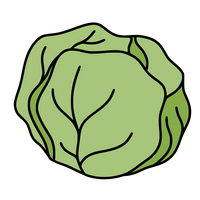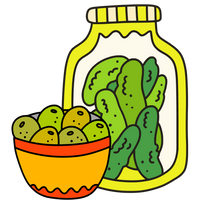
It’s the most wonderful time of the year. Constant sniffles, piles of tissues everywhere, and endless doctor visits - flu season.
Those flu-related visits to your favorite local M.D. usually come with a prescription for antibiotics to free you of your never-ending symptoms.
When flu season gets ya down, remember, antibiotics are kind of a double-edged sword.
On one side, they are busy kicking your flu symptoms to the curb, giving you some much-needed relief so you can actually breathe through your nose again. On the opposite side, they are wreaking havoc on your gut microbiome.
Gut Health 101: Antibiotics wipe out good and bad gut bacteria. [1]
If your gut has been a recent victim of antibiotics, it might feel like gas, bloating, cramping, and extra potty time.
The bad news is that your gut won’t just bounce back easily on its own. You’ve gotta rebuild your gut health, and probiotics are ready to swoop in and save the day.
Let’s dive in! Learn more about probiotics after taking antibiotics, how to restore gut health during flu season, and why prevention is always the best medicine.

Antibiotics: How They Work, and What They Actually Do to Your Gut
Antibiotics aren’t exactly the bad guys here. They are powerful destroyers of bacteria. But they’re not selective on their quest to seek and destroy.
Along the way, they often demolish the good bacteria in your gut, too. Making your gut health and probiotics the perfect pairing during flu season.
Let’s Talk Gut Demolition
Gut health and antibiotics do not go hand in hand. Your gut bacteria are the front-line defense of your immune system, so wiping out the good bacteria, especially during flu season, isn’t great.
When antibiotics wipe out good gut bacteria, it can come with these short-term side effects:
- Bloating
- Irregular Digestion
- Lowered Immunity
Even worse are the potential long-term side effects of antibiotics on gut health:
- SIBO (a condition where an overgrowth of bad bacteria happens in the gut) [2]
- Candida Overgrowth
- Weakened Digestion
Once you start experiencing these symptoms, it can take anywhere from a month and a half to 180 days for your gut microbiome to restore your gut health after antibiotics. [3]
Gut health and probiotics have a direct connection through fermented foods! When the good bacteria in your gut are wiped out by antibiotics, ferments work to repopulate and reinoculate your gut.

Probiotics after Antibiotics: Rebuilding Your Gut
Probiotics are foods or supplements that contain live cultures of good bacteria. Consuming probiotic foods like fermented pickles and sauerkraut can help promote good gut bacteria by introducing helpful microbes into the gut.
To restore gut health after antibiotics, the magic word is reinoculate.
There’s a framework for rebuilding your gut microbiome, called the 5 R’s.
- Remove
- Replace
- Reinoculate
- Repair
- Rebalance
Learn More: How to Reset Your Gut Health
Keeping your gut health balanced during flu season and after antibiotics is about focusing on step 3 and “re-seeding” your gut with good bacteria.
The process of re-seeding your gut works to restore the balance of good gut bugs by re-introducing them to your diet through probiotics and fermented foods. It can really be as easy as enjoying savory ferments like pickles, sauerkraut, olives, LiveBrine pickle juice, and making probiotics a key element to helping you achieve a healthy gut microbiota balance.
Pro Tip: Reinoculate 3x a day with ferments for maximum benefit. Think of it like watering a plant; the right amount each day goes farther than dumping in a bucket of water once a week.
During flu season, you can still enjoy your favorite tea, citrus fruit, and piping hot soup. But adding ferments to the lineup will allow you to follow the probiotics after antibiotics mantra.
Probiotics as a Food Source or a Supplement, Who Wins?
Technically, you could also take probiotic supplements for a little added gut health support during flu season, after antibiotics.
But we prefer to eat our probiotics in the form of a whole food source. Crunchy, salty ferments are much more fun than taking a handful of pills (in our humble opinion).
Our favorite way to reinoculate is to enjoy ferments 3x a day during flu season with:
There’s also no regulation on dietary supplements like probiotics.
In an analysis [4] of various probiotic brands sold in the U.S., Consumer Labs found that 5 of the 19 brands examined did not contain the number of live microorganisms stated on their label. Even worse, some of them contained contaminants from harmful bacteria or mold.
At OMP, our ferments are verified by third-party lab testing to ensure each serving contains up to 14 billion CFU of lactic acid bacteria. A beneficial amount of lactic acid bacteria is between 10 to 20 billion CFUs for maintaining gut health!
Focus on Gut Health During Flu Season (Not Just After)
Prevention is always the best medicine, don’t ya think? During flu season that starts with gut health and probiotics.
A whopping 70-80% of immune cells are in your gut! [5]
A healthy and diverse gut microbiome, especially during flu season, means:
- Stronger immunity
- Faster recovery
- Fewer infections to begin with
Fermented foods work like a natural line of defense, coming in hot with a supply of probiotics, enzymes, vitamins (C, K, B12), and minerals in every crunchy, flavor-filled bite.
Basically, it's a food-as-medicine approach, and ferments are your daily multivitamin!
For those moments during flu season, when just the thought of food makes you feel sick,
LiveBrine Probiotic Pickle Juice is a great source of support for hydration and electrolytes.
Gut health and probiotics during flu season do not have to be an all-or-nothing approach.
Small, attainable, everyday habits like reducing gut health villains (aka sugar, the original agent of chaos) can help keep your immunity balanced and ready to ward off anything that comes your way.
Avoiding Gut Health Villains: 9 Everyday Habits for Better Gut Health
Lowering Inflammation During Flu Season
Another key to prevention, as the best source of medicine, is avoiding inflammation during flu season.
When your body encounters a virus or bacteria, like the flu, it activates your immune system, sending out inflammatory cells. These cells work to trap culprits or heal injured tissues.
Inflammation is needed for the healing process, but it shouldn’t be present if you’re not experiencing flu symptoms.
If your gut is experiencing chronic inflammation, it can hinder your ability to ward off the flu. Gut health and probiotics during flu season will boost your immune system and your ability to fight when it’s time, and not before.
Here are 5 foods that actively ward off inflammation:
- Berries
- Fermented Foods
- Turmeric
- Dark Leafy Greens
- Green Tea
Read More: 5 Gut-Healthy Foods That Fight Inflammation
Try it, OMP’s Gut Health Trifecta: fat, fiber, and ferments at every meal for resilience!
Your Flu Season Secret Weapon - Fermented Foods
Antibiotics are sometimes necessary, especially during flu season. But they can leave your gut vulnerable, your microbiome wiped, and your immune system compromised.
Fermented foods aren’t just a side dish; they are your tasty recovery and prevention plan. They restore good gut bacteria after the negative side effects of antibiotics.
Don’t Wait Until You're Sick To Start Healing
Prevention is the key to keeping your gut health balanced with good bacteria.
Natural probiotics like our fermented olives and pickles will support your gut health during flu season, battle chronic inflammation, and help you maintain a thriving gut microbiome.
It’s really as easy as starting with 1-2 servings of fermented foods each day. Ready to enjoy prevention as the best medicine this flu season? Try the Best of OMP 3-Pack, or Building Your Own Box!
Build a Better Plate: Your Guide to a Gut-Healthy Diet, Finding the Balance
References
-
Maier, Lisa et al. “Unravelling the collateral damage of antibiotics on gut bacteria.” Nature vol. 599,7883 (2021): 120-124. doi:10.1038/s41586-021-03986-2. https://pubmed.ncbi.nlm.nih.gov/34646011/
-
Dukowicz, Andrew C et al. “Small intestinal bacterial overgrowth: a comprehensive review.” Gastroenterology & hepatology vol. 3,2 (2007): 112-22.https://pmc.ncbi.nlm.nih.gov/articles/PMC3099351/
-
Palleja, Albert et al. “Recovery of gut microbiota of healthy adults following antibiotic exposure.” Nature microbiology vol. 3,11 (2018): 1255-1265. doi:10.1038/s41564-018-0257-9 https://pubmed.ncbi.nlm.nih.gov/30349083/
-
Kligler, Benjamin, and Andreas Cohrssen. “Probiotics.” American family physician vol. 78,9 (2008): 1073-8. https://pubmed.ncbi.nlm.nih.gov/19007054/
-
Wiertsema, Selma P et al. “The Interplay between the Gut Microbiome and the Immune System in the Context of Infectious Diseases throughout Life and the Role of Nutrition in Optimizing Treatment Strategies.” Nutrients vol. 13,3 886. 9 Mar. 2021, doi:10.3390/nu13030886. https://pubmed.ncbi.nlm.nih.gov/33803407/
DISCLAIMER: THIS WEBSITE DOES NOT PROVIDE MEDICAL ADVICE
The content on this website is for informational or educational purposes only and does not substitute professional medical advice or consultations with healthcare professionals. Always seek the advice of your physician or other qualified healthcare provider(s) with any questions you have regarding a medical condition or treatment and before undertaking a new health care regimen.













